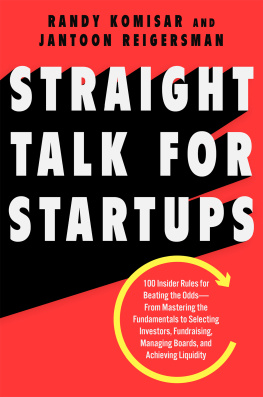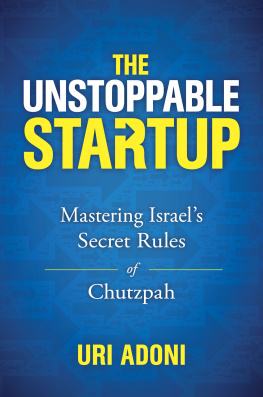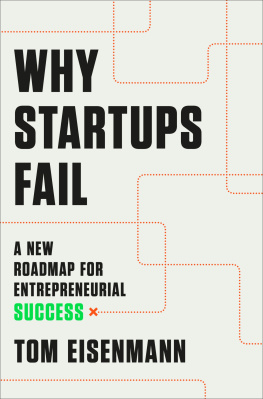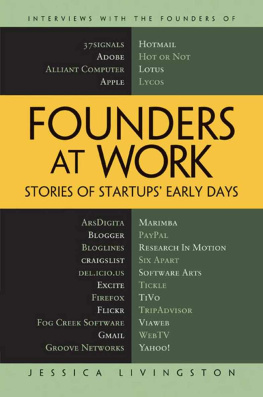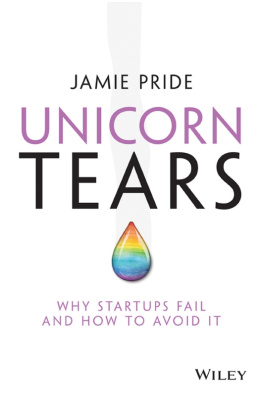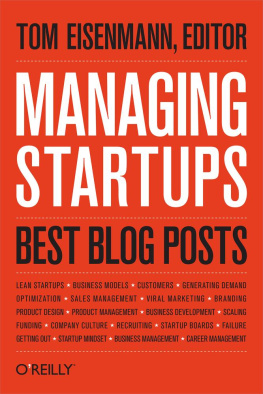Contents
For all the Rule Breakers who make this world a better and more interesting place.
In memory of Bill Campbell and Tom Perkins, Rule Breakers Extraordinaire.
You cant help but be impressed by the widespread enthusiasm for entrepreneurship today. What started as pockets of largely government-funded research and development in the United States following World War II has bloomed into a global economic phenomenon. Thirty years ago, entrepreneurs were a rare breed of iconoclast. The second wave of Silicon Valley (the first being semiconductor companies like Intel and National Semiconductor, thus the name Silicon Valley) was led by hippies in search of a personal technology utopia. Compared with todays sophisticated army of founders, equipped with glossy pitches and ambitions measured in billions, not just millions, those flower children were nave, wide-eyed idealists.
And while Silicon Valley is still iconic, the entrepreneurial explosion is global: Stockholm, Berlin, Cambridge, London, Tel Aviv, Bangalore, Hyderabad, Beijing, Shanghai, and on and on. There is no monopoly on innovation. There is invention wherever there are smart people, and that is everywhere. Even the name Silicon Valley is a misnomer. What started in the orchards north of San Jose is now in full bloom up the Bay in San Francisco, as well as in Oakland. But entrepreneurship is more than mere invention; it is the best practice for creating market value from innovation, with limited resources. And while it is remarkable how quickly other places in the world are narrowing the gap between themselves and Silicon Valley, there is still an advantage to the incumbent.
Is it the venture capital? Yes, but... The but being that capital follows opportunity; it doesnt create it. As other places on the planet demonstrate monstrous financial successes like Baidu and Alibaba, Skype and Spotify, investors will follow.
Is it the attitude toward risk? Sort of... For more than seventy years, Silicon Valley has developed a constructive view of failure. Realizing that success is not within anyones controlunless you failed for being dumb, lazy, or criminalthe Valley doesnt punish you for your business failures; to its great advantage, it puts your hard-earned experience back to work on the next big thing. Compare this with most other business cultures, where failure disqualifies you from future opportunities. Still, it is hard to argue that bold entrepreneurs in China, Israel, Sweden, and elsewhere arent comfortable with the same daunting levels of risk.
Is it the experienced talent? Yes, and... The and being that its not simply that the best talent comes to Silicon Valley from all over the world to seek their fortunes; its that successful talent stays in Silicon Valley and reinvests itself in each new generation of entrepreneurs. While a successful European entrepreneur may make a hasty retreat to the South of France, in Silicon Valley the winners double down as angel investors, venture capitalists, board members, advisers, coaches, and mentors. If you walk into a Sand Hill Road venture capital office and see a gray-haired, lanky bloke in Birkenstocks sitting across the table from a young woman in jeans and an untucked shirt, chances are she is an entrepreneur getting a direct hit of wisdom from a mentor who has been down a similar path more than a few times before. He may already be wealthy enough not to care whether the meeting will turn into money, but he is intent on staying relevant by sharing hard-won lessons with a new generation of aspiring entrepreneurs.
Have you ever felt like everyone else knows something they just arent telling you? That no matter how close you get to the source of money, talent, and wisdom, you cant quite get through the door? The ability to help entrepreneurs accelerate past this stage of confusion is the Silicon Valley advantage. Its not the big things; its the little thingsthe wealth of experience, the tricks of the trade, the wisdom shared by the winners but somehow just out of the reach of the contenders.
That is why we wrote this book.
Collectively, we have been privileged enough to have front-row seats in this world for the past forty-five years. I have been a partner at the venerable venture capital firm Kleiner Perkins since 2005. I started as a lawyer and entrepreneur in Silicon Valley more than thirty years ago. I am a bit of a jack-of-all-tradesan entrepreneur, a seasoned CEO, and an investor all in one. My operating career spans decades, beginning with a private legal practice in technology law and then moving on to positions as senior counsel at Apple, co-founder and VP Business Affairs at Claris Corp., CFO and VP Operations at GO Corp., CEO of LucasArts Entertainment, and CEO of Crystal Dynamics. I have invested in and sat on the boards of dozens of innovative startups, like WebTV, TiVo, RPX, and Nest, as well as many social ventures. In the 1990s I created the role of Virtual CEO, partnering with innovative founders to help them develop into leaders and turn their ideas into businesses. I also wrote The Monk and the Riddle and co-authored Getting to Plan B and I F**king Love That Company. For the better part of a decade, I taught entrepreneurship at Stanford University.
Jantoon first parachuted into his role as an executive of a Silicon Valleybacked venture almost a decade ago. He spent the earlier part of his career in mergers-and-acquisitions investment banking at Morgan Stanley and in special-situations investing roles at Goldman Sachs. He came to Silicon Valley with great admiration for its bold, boundless thinking. Soon, however, Jantoon realized that, while dreaming and innovating are fundamental to Silicon Valleys success, without excellent execution it is all for naught. He noticed that entrepreneurs were constantly reinventing the wheel, oblivious of the hard-learned lessons of their predecessors. Despite having access to a sophisticated board and several hundred millions of dollars of investment from many of the leading venture funds, strategic investors, and sovereign wealth funds, Jantoon experienced firsthand the failure of operating discipline that results from a lack of alignment between founders, management, investors, and the board.
We first met at a Kleiner Perkins event. When I discovered that in between jobs, Jantoon spent his time climbing twenty-thousand-plus-foot peaks and diving five hundred feet below the sea, we became fast friends. We would get together whenever Jantoon came to town, largely to catch up on his latest adventures, but inevitably our discussions returned to business. Specifically, to what really was going on in the Kabuki Theater of venture capital and startup boards. Jantoon thought he knew the rules, but at some point, the boardroom always seemed to tilt on him, and he was loath to believe that smart people could do such dumb things. He kept wondering what he was missing.
And so our chats became freewheeling romps, psychological analyses, and financial forensics. Jantoon caught on quickly and began seeing the light behind the shadows. As he understood more about the business of venture capital, the incentives for directors, and the magical investment math of the capitalization tables, things started to click.
Jantoon had also developed a close relationship with Tom Perkins, one of the pioneers of venture capital. This wasnt a surprise to me: Tom always loved freethinkers, adventurers, and iconoclasts. He is a legend in Silicon Valley. His career spanned entrepreneurship, senior management, and, most notably, venture capital. In 1972, Tom formed Kleiner Perkins Caufield and Byers with his co-founder, Eugene Kleiner. Their partnership and legacy have given life to some of the most significant and innovative businesses in the world: Google, Amazon, Nest, Intuit, Netscape, Sun Microsystems, Compaq, Tandem, Genentech, and many others. Tom became Jantoons mentor, swapping his own stories about the inside workings of startups and venture capital.

